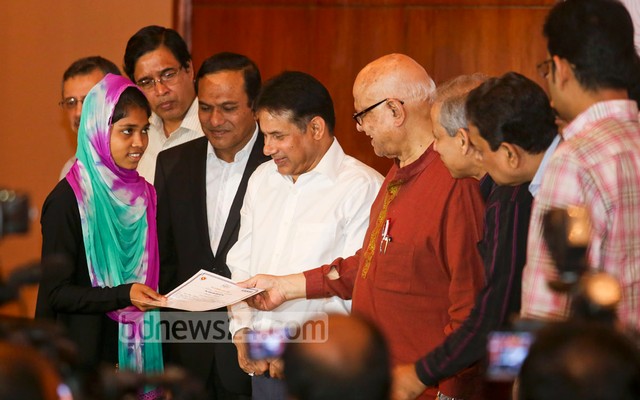
The finance minister hands over certificate to a worker on completion of her training
Finance Minister Abul Maal Abdul Muhith has said that foreigners who work in Bangladesh remit $4 billion every year to their respective countries.
He has blamed ‘inefficiency’ of Bangladeshis for the outflow stating that this huge amount could have been saved had there been ‘skilled manpower’ in the country.
He gave the figure at a function of the BGMEA, the apex body of Bangladesh’s garment manufacturers and exporters, on Monday.
Many foreigners are employed in the readymade garment sector.
The programme was organised at the Pan Pacific Sonargaon Hotel in Dhaka to hand over certificates to readymade garment workers who took part in the ‘Skills for Employment Investment Programme’ (SEIP).
Addressing the event, Muhith said, “Foreigners are coming to work in Bangladesh as skilled manpower due to lack of local ‘skilled workers’ and taking $4 billion away every year.”
“This huge amount of money could have been saved if we can make the workers and mid-level managers more capable through effective training,” he added.
Bangladesh Garment Manufacturers and Exporters Association’s acting President SM Mannan Kachi said, “The garment sector is running with a 30 percent shortage of workers while a major portion of the population remains unemployed.”
“We need to seriously consider using this situation to our advantage,” he said.
Muhith said the SEIP project, aimed at developing the skills of workers starting from new employees to mid-level managers through training, was working to create 43,800 skilled readymade garment factory workers.
Total 260,000 workers of five sectors including RMG would receive such training, he said, adding the government would provide $200 million of the $1 billion five-year-long project and the Asian Development Bank rest.
“There are many weaknesses in efficient management. Without becoming fully efficient, economic progresses the nation dreams of won’t be reached,” the minister said.
“That’s why the government is giving priority to creating skilled manpower.”
SEIP project’s Director Jalal Ahmed said after the workers complete their training Bangladesh would be able to export more skilled manpower after meeting the domestic demand.
Source: Bd news24

